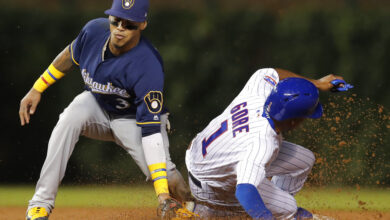
Chili Davis Admits to Poor Communication with ‘Millennial Players,’ Wishes Anthony Iapoce ‘Better Success’
The Cubs were held to either one or no runs in nearly a quarter of their games this season, but that’s not why Chili Davis was fired. Nor was it the anemic home run total of 167 that ranked 11th in the NL and fell 56 dingers shy of last year’s mark. Those things were undoubtedly the facade of the building, but the foundation of the problem was rooted in poor communication.
We learned soon after Davis’s firing that several players were critical of his methods during their exit interviews. It was said that the messages were “too strong to ignore” and that opening a new season with Davis as the hitting coach would have been “counterproductive.”
The former switch-hitting All-Star spent nearly two decades in the majors, but he had trouble relating to players who weren’t even in kindergarten when he was finishing his career. He admitted as much on his way out of town, chalking the disappointing campaign up to a failed experiment.
“I guess I need to make some adjustments in the way I deliver my message to the millennial players now, Davis told Gordon Wittenmyer of the Sun-Times. “I need to make those adjustments for the next job I get, if there is one. But without losing my identity,” he added. “Because I know what I know. And I know what I bring is not wrong. I’m not going to blame myself for this. I’m not going to blame anyone. It didn’t work.”
Though Davis was adamant there are no clouds in the sky as far as his feelings about his time with the Cubs, he did shake his fist at some of the hitters with whom he didn’t mesh.
“[R]egardless of who’s there, certain players there are going to have to make some adjustments, because the game’s changed, and pitchers are pitching them differently,” Davis cautioned. “They’re not pitching to launch angles and fly balls and all that anymore. They’re pitching away from that.”
True as that may be, the fact of the matter remains that the Cubs did a terrible job of hitting the ball in the air and out of the park. Their second-half grounder percentage was the highest in baseball and that’s simply unacceptable. To paraphrase Theo Epstein, launch angle is not a fad. Nor is effective communication.
If moving on from Davis just a year after parting ways with John Mallee feels like a tacit mea culpa on the part of the front office, well, that’s pretty much what it is. They believed at the time that the best way to help their young hitters take the next step was to bring in a new coach with a different message and approach. It failed.
Now the Cubs are hoping that Anthony Iapoce, who served as assistant to the GM in Chicago from 2013-15, can fix the holes they’ve punched in the drywall over the last two years of frustration. They’d probably like for him to fix holes in a few swings as well, which he’ll attempt to do with a holistic approach.
Get it? Holes, holistic. Yeah, I’ll go ahead and move on now.
“We all believe in the same things,” Iapoce told the Tribune’s Mark Gonzales Monday night. “We just present it differently.
“But you’re still trying to make the players better and find that team ego that develops over time. That involves everything, not just one thing. It comes down to the situation and what player has to do. It’s important to provide an atmosphere where they can improve.”
That last part is basically a response to Epstein’s rhetorical question about whether the Cubs were “doing everything we can in creating the right situation to get the most out of these guys.” That will be Iapoce’s biggest task moving forward, with the success of the environment he creates judged in terms of homers and runs.
Eli Weaver, who covers the Rangers for The Athletic, offered a positive assessment of Iapoce’s ability to relate to players when he joined Bernstein & McKnight on 670 The Score Tuesday afternoon. Rather than just drilling away all day in the cage, Weaver said Iapoce is more about “shooting the breeze” and picking players’ brains. He sought to determine what made each hitter tick, then used that to help them.
There’s a pervasive misunderstanding out there about what a hitting coach’s role is at the highest level of the sport. It’s not to mold players in his image or to teach them how to hit; they damn well better know how to do that by the time they reach the majors. The job is more about helping hitters to understand what makes them better and how to adjust in order to foster their abilities.
Davis apparently wasn’t able to do that, at least not across the board with the players upon whom the Cubs are most depending. Iapoce was brought in because of his ability to speak to players on their respective individual levels, so now it’s a matter of translating that to a more consistent offense. No pressure there.

